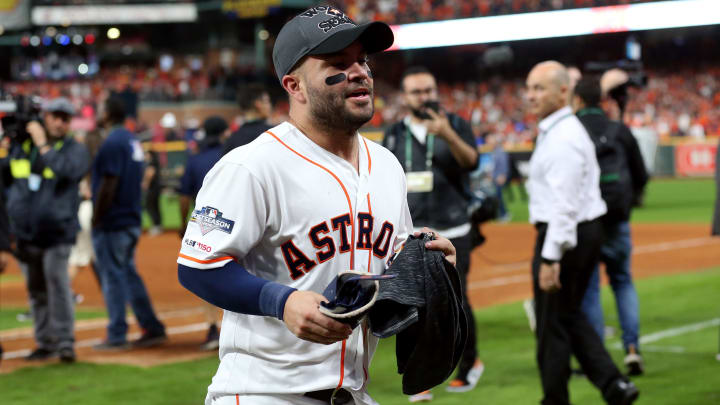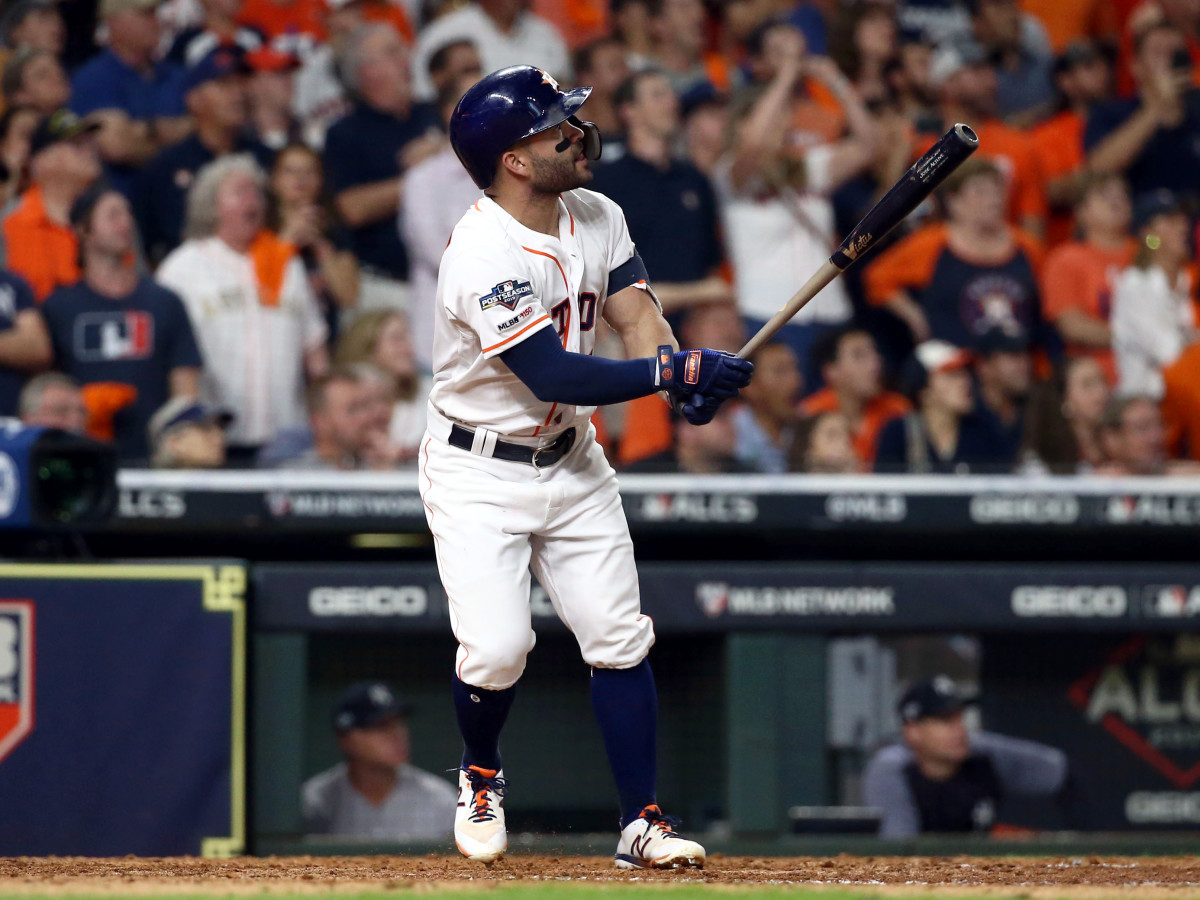Jose Altuve Delivers Postseason Moment Worthy of His Stature in Baseball


HOUSTON – If you get it, in the way a poet hears the muse and a sculptor sees the form, you know how good baseball can be for the soul. Baseball can be our companion on a car radio on a summer evening, our place to dine al fresco with family as we wonder from the third deck how the umpire could possibly have missed that pitch, or simply ballast to our busy lives, always there when we need it.
There are as many reasons to love baseball as there are pitches in a season. One of the best of them, even if you are a New York Yankees fan who just watched him cut through your heart with one mighty swing, is Jose Altuve, the dynamo of a second baseman for the Houston Astros.
All that is great about baseball is packed into that 5-foot-6, 165-pound body, like one of those super concentrated detergents. A little goes a long way. Altuve plays baseball like the wag of a puppy’s tail. He plays joyfully. And he plays well.
He also plays hungry, though he already has won a World Series and is just two years into a seven-year, $163.5 million contract. And at his size, he is the beacon that makes clear that people of just about any size can play this game and play it very well.
“Jose Altuve is just a great human being and a great baseball player,” said Justin Verlander, one of his Houston teammates. “He is everything you would want in a person and teammate.”
Saturday night, as if repaying a debt, the game created a moment for Altuve. Not just a highlight, but one of those Bobby Thomson/Hank Aaron/Chris Chambliss moments that get forever preserved in the game’s amber.
Altuve won the pennant for the Houston Astros Saturday night with a bottom-of-the-ninth two-out, two-run homer off one of the baddest closers of this generation, Aroldis Chapman of the Yankees. Chapman should never have allowed Altuve even the chance to do so, but from the moment Altuve showed up at a second Astros camp all those years ago after being told at the first one to stay home because he was too small, all the man needs is a chance.
José Altuve!
— SI MLB (@si_mlb) October 20, 2019
Absolutely incredible. Houston is rocking.
(via @FOXSports) pic.twitter.com/L330Y9w83p
Having ended Game 6 of the American League Championship Series, Altuve simply dropped his bat and ran humbly but proudly around the bases with his chest out like a young hawk while the rest of Minute Maid Park, whipsawed from a wild swing of emotions in an epic game, erupted with the noise of a thousand freight trains.
“It was just so perfectly fitting,” Verlander said. “It could have been nobody else but him.”
Houston manager A.J. Hinch has a favorite story he likes to tell about the heart of Altuve. It was 2015, and the Astros had just lost, 7-2, to Kansas City in the Division Series clincher. Altuve hit .136 in the series. Hinch was in his office—before he even had a chance to address his team—when Altuve walked in.
“He was in tears,” Hinch said, “and he apologized to me. All I could do was hug him and tell him, ‘Don’t apologize. You’re the reason we’re here. And you’re the reason why we’re going to be winning for a long time.’”
Two years later, the last groundball of the 2017 World Series rolled into the glove of Altuve as if by providence, and the Astros won their first World Series.
The story of his pennant-winning homer is just as karmic.
The Astros had led the entirety of Game 6 until the ninth, when Yankees first baseman DJ LeMahieu, refusing to be put away by closer Roberto Osuna, ended a 10-pitch battle by hitting a home run just beyond the outstretched arm of rightfielder George Springer.
DJ LeMahieu plays the hero in the ninth!
— SI MLB (@si_mlb) October 20, 2019
(via @YESNetwork) pic.twitter.com/ukKUrpuD2a
Tied at 4, the Yankees were better positioned for the win. They still had Chapman and Luis Severino to pitch, and the Astros were about to give the ball to Hector Rondon, who had pitched to two batters in the previous three weeks.
Chapman bullied his way through Martin Maldonado and Josh Reddick to start the last of the ninth. Springer and Altuve were the next two hitters, followed by Jake Marisnick, a defensive specialist and .233 hitter whose last RBI was 39 days ago.
Chapman’s top priority to was to guard against the home run by pitching carefully around Springer and Altuve. He walked Springer on five pitches, three of them sliders.
With Altuve, Chapman threw two fastballs designed to get Altuve to chase if he wanted, but Altuve did not bite. Then Chapman flipped in a decent 2-and-0 slider for a strike, arriving as confirmation that he was not going to give in to Altuve, not with Marisnick standing there on deck.
“I’ll tell you what I was thinking,” Altuve said. “I was looking for something in the zone—something up. Because when he is throwing 99 [mph] down, I’m not going to hit that. That’s nasty. If the ball is up I have a better chance.”
Chapman threw another slider. Chapman’s slider is designed to get hitters to stop from just sitting on his fastball. It traffics as much on the fact that it’s not a fastball as it does on its break, which varies from good-not-great to “uh-oh.” Hitters take the pitch slightly more than half the time.
But it’s when Chapman’s slider does nothing—it just hangs there like an 84-mph changeup—that it becomes an invitation for big trouble. Only one hitter managed to hit Chapman’s fastball for a homer this year, J.D. Martinez. But the slider becomes a home run pitch when it doesn’t break, which is what happened for Travis d’Arnaud, Eloy Jimenez and now Altuve.
Chapman didn’t want to give in to Altuve. He just made a terrible pitch with his second-best pitch.

Start with the target. Catcher Gary Sanchez for some reason set up in the middle of the plate, which is not where Chapman should be throwing a slider. As is his bad habit, as Chapman loaded to throw Sanchez let the glove droop with the palm facing the ground and near it, which not only gives the pitcher no visual target but also creates unnecessary hand movement as he has to pick up the glove to catch the pitch.
All series Sanchez was losing strikes because he does not have quiet hands, or he was turning his back to the plate and running to the backstop, be it for dropped third strikes, wild pitches he could not block because he doesn’t set his chest forward, or passed balls he simply boxed. At times it looked like the heavy catchers’ load of the postseason—navigating detailed scouting reports, multiple sets of signs, frequent pitching changes and sign-stealing paranoia—had a corrosive effect on his offensive game as well. He swung at more pitches out of the strike zone than any other hitter in the ALCS.
This Chapman slider broke not at all. It just hung near the top of the zone and away. Altuve walloped it off the big wall in leftfield for a two-run homer and a 6-4 epic win.
“I don’t even know how I did it,” he said. “That guy is nasty. He is so good that I just reacted. It was there and I swung. I couldn’t believe I did it.”
Think about the magnitude of that mistake by Chapman. He lost the ALCS by getting beat by Altuve with Marisnick in the on-deck circle and two outs.
“I thought they were not going to pitch to him,” Houston shortstop Carlos Correa said. “Altuve has been hot all series long. They shouldn’t have pitched to him. But I’m glad they did. Thank you.”
Yankees manager Aaron Boone was visibly pained after the game. “This hurts,” he said.
Boone was in his rights to trust Chapman to pitch smartly rather than automatically put Altuve on with an intentional walk. Marisnick had faced Chapman once in his career, in 2017, and struck out.
“Yeah, certainly not a walk, an intentional walk situation, but kind of pitching him aggressively like you're ahead the whole time,” Boone said. “And I think Chappy did, he just hung a breaking ball. That's obviously a pitch he's trying to not give in and probably get down and out of the zone, see if you get a chase or something and he hung it.”
New York GM Brian Cashman, who had built a 103-win team on his bullpen investments and the depth that helped withstand so many injuries, was walking to the team bus that would take the Yankees home for the winter when he settled on the right words for the sudden death to the season. “The magic carpet ride,” he said, “was shot down by a surface-to-air-missile.”
Said Verlander, “As a pitcher you know there are places you can go with most every hitter to attack his holes. Jose has the ability to cover up his holes. He’s so dynamic in his ability to put the barrel of the bat on the ball. It’s one of the most amazing things I’ve ever seen.”
The home run ball bounced off the giant wall and back on to the field. Yankees leftfielder Brett Gardner picked it up. He saw Houston bullpen catcher Javier Bracamonte walking past him toward the pile of Astros gathering at home plate.
“Here,” Gardner said, handing him the ball. “Take this. You guys are a great team. Now go win the World Series. Represent the American League well.”
Said Bracamonte, “It was so classy. And Aaron Judge gave me a hug and said the same thing. I have so much respect for those guys.”
Bracamonte later gave the ball to an MLB authenticator.
The ball and the moment belong to Altuve. We have arrived at a World Series that will take us back to the 1960s, with marquee starting pitchers going toe to toe to see who can stay in the game longer. Gerrit Cole vs. Max Scherzer. Verlander vs. Stephen Strasburg. Zack Greinke vs. Patrick Corbin. That’s five Cy Youngs (and one to be named) in the first three games. Only once in the past 31 World Series games have both starters lasted seven innings. This will be different. Old is new again.
But you must figure that Altuve will be in the middle of whatever drama unfolds. No team has kept Altuve off base in his past 19 postseason games. This ALCS-ending moment, you can be sure, is not enough for him or this team.
One of the greatest challenges in baseball today is the virus of complacency that attacks from within once players and teams win a championship. It struck the Cubs and it struck the Red Sox. It is human nature, especially when it is so hard to win just once. No team has defended its World Series title for 19 straight years, the longest stretch in history.
After the Astros won in 2017, they actually won more games in 2018, but were bounced from the playoffs by Boston largely because Altuve and Correa were playing hurt. This year the Astros won more games yet again. They have improved from 84 wins to 101 to 103 to 107 in the past four years, the trajectory of the rare group immune to complacency. Altuve is the spirit of this team. The spirit of what is good about baseball.
“We love winning,” Hinch said. “And we love the challenge of winning when everybody expects it.”
